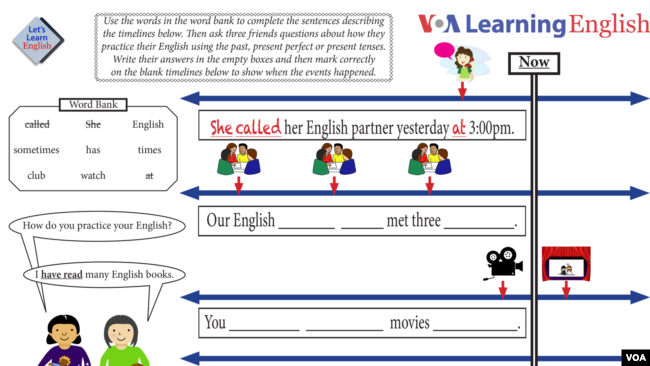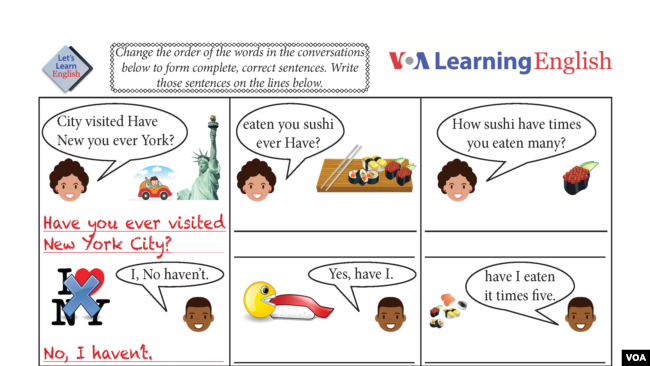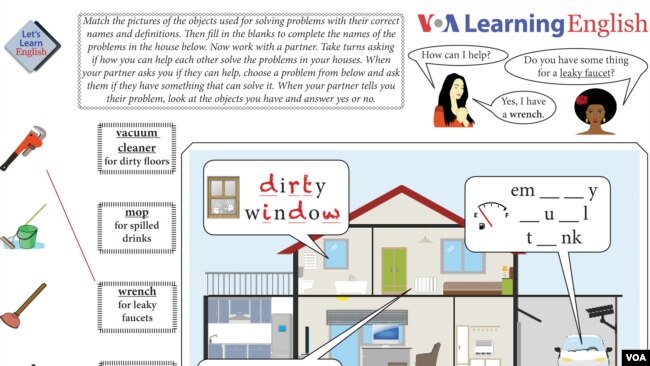Summary
Ms. Weaver has asked Anna to help with Operation Spy. Her mission is to learn all she can about spying. She learns by going to the International Spy Museum in Washington, D.C.Speaking
In this video, learn how to say the new words. Then compare the present perfect, present, and past verb tenses.
Pronunciation
Use this video to learn about how Americans pronounce the reduced forms of "has" and "have' in the present perfect verb tense.Conversation
Ms. Weaver: Hello, Anna, are you there?
Anna: That’s her. Yes, Agent Peacock. This is Agent Flamingo, reporting for duty.
Ms. Weaver: Agent what? Look, Anna … I mean, Agent Flamingo, I want you to learn all you can about spying.
Anna: You mean, collect intelligence?
Ms. Weaver: Yeah, it’s for our new show -- “D.C. Secrets.”
Anna: You've got it, Agent Peacock. The mission is safe with me.
Ms. Weaver: Oh, okay, great. Just be back by noon.
Anna: Agent Peacock, I’m at an air duct!
Ms. Weaver: Yes, spies sometimes sneak down air ducts.
Anna: I have never snuck down an air duct. It’s dark and small. I’m afraid of dark, small places.
Ms. Weaver: You can do it, Agent Flamingo. You know, spies aren’t afraid of a little darkness.
Anna: Right. It’s just an air duct -- a dark, small air duct. Okay. I’m doing it, Agent Peacock! I am sneaking down a long, dark, small air duct. I’m having a little trouble breathing.
Ms. Weaver: Just keep going, Agent Flamingo. Think of the team!
Anna: Okay, I will think of the team. I’m thinking of the team,
Agent Peacock! I did it! I did it! I sneaked down an air duct. That was a
little uncomfortable.
Ms. Weaver: Good!
Anna: What's the next mission?
Ms. Weaver: Umm … have you ever cracked a code?
Anna: No.
Ms. Weaver: Well, go learn. Spies use their brains.
Anna: Got it! I’ve never cracked a code before. Let’s try, Agent
Flamingo! This is really hard. I'm still trying to crack the code. I've
cracked the code! I've cracked the code, Agent Peacock! My brain really hurts.
Ms. Weaver: Great. Umm, Agent Flamingo, now answer this question: Do spies have to be in good shape?
Anna: “Yes,” Agent Peacock! Spies have to be in really good shape! Can you hear me?
Ms. Weaver: You’re breaking up, Flamingo.
Anna: The International Spy Museum is awesome! Agent Peacock, I completed the mission!
Ms. Weaver: Great. Great. Now, I have another very important mission for you.
Anna: Got it. See you back at H.Q.!
Ms. Weaver: Yummy! You brought my lunch! Thanks, Agent Flamingo!
Anna: Mission completed. Agent Peacock!
(Amelia makes a face.)
Ms. Weaver: Don't ask.
Special thanks go out to the International Spy Museum for letting us film in the museum!
Writing
In this lesson, Anna learns about a job that many people think is exciting. Have you ever thought about doing a job that is different from the one you have now, or the one you think you will have when you finish school? Would it be more fun or more exciting? Tell us about the job. Write to us by email or in the Comments section.Click on the image below to download the Activity Sheet to practice three verb tenses and learn about how your friends practice speaking English. Please note, our activity sheets now can be completed on the computer.
Learning Strategy
Learning Strategies are the thoughts and actions that help make learning easier or more effective.The learning strategy for this lesson is Find Practice Opportunities. This strategy is what we use when we look for any chance we can get to practice speaking, listening to, reading, or writing English.
In this lesson, Anna is learning about being a spy. She practices some of the things that spies do - sneaking down an air duct, cracking a code, and staying in good shape. She found a good opportunity to practice spy skills. These experiences will help her to write a good story for her children's show.
What do you do to find opportunities to practice English? Maybe you meet another English learner for coffee and speak English when you are together. Maybe you write emails or texts to a friend in English. Or you could read in English for fun: novels, comics, blogs, tweets, and so on. Write to us about how you look for ways to practice in the Comments section or send us an email. Teachers, see the Lesson Plan for more details on teaching this strategy.



